Events & Trips
Upcoming Events
About a month before the beginning of each term, AALL sponsors an Assembly—a presentation of general interest that is open to the public. The current Assembly topic and speaker are described below, followed by a sampling of some previous Assemblies (which are also described in the past newsletters).
Members may complete the class registration process and pay their fees (if any) in person at the Assembly.
Winter Assembly: Ford BlueOval Battery Park Michigan
January 23, 2025, 10 a.m.
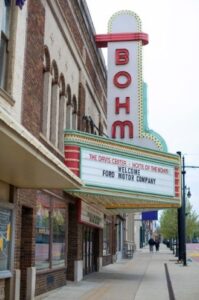 Candice Braddock, Manager of Community Relations and Leslie Spicer Williams, Talent Acquisition and Recruiting Specialist, an Albion native employed at FBOBPM, will give an update on Ford’s development in Marshall and the implications for the Albion community. Reports indicate that construction is about 20% complete, and production is expected to begin in 2026. The plant will produce low-cost lithium iron phosphate (LFP) batteries for Ford’s electric vehicles. Ford expects to create over 1,700 jobs at the plant which will significantly impact the Albion community.
Candice Braddock, Manager of Community Relations and Leslie Spicer Williams, Talent Acquisition and Recruiting Specialist, an Albion native employed at FBOBPM, will give an update on Ford’s development in Marshall and the implications for the Albion community. Reports indicate that construction is about 20% complete, and production is expected to begin in 2026. The plant will produce low-cost lithium iron phosphate (LFP) batteries for Ford’s electric vehicles. Ford expects to create over 1,700 jobs at the plant which will significantly impact the Albion community.
Due to extreme cold, the Winter Assembly will be broadcast live at facebook.com/albionfumc
Wesley Chapel, 600 E Michigan Ave, Albion, MI 49068
Get Directions
Recent Events
Fall Assembly — River Raisin National Battlefield Park: Telling All Sides of the Story
Thursday, September 5, 2024, 10 a.m.
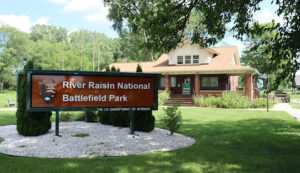 Our guest speaker will be Dennis Moore, a Retired National Park Service Interpretive Ranger and Albion College alumnus, who will speak on “River Raisin National Battlefield Park: Telling All Sides of the Story”. Everyone will learn something new if you attend this informative presentation. Come, bring a friend, and enjoy a delightful morning.
Our guest speaker will be Dennis Moore, a Retired National Park Service Interpretive Ranger and Albion College alumnus, who will speak on “River Raisin National Battlefield Park: Telling All Sides of the Story”. Everyone will learn something new if you attend this informative presentation. Come, bring a friend, and enjoy a delightful morning.
Spring Assembly: The Age of the Learned Machine
Thursday, April 11, 2024, 10 a.m.
We are at the beginning of arguably the most dramatic period in human history, the age of AI. We have already seen machines that drive cars, diagnose cancers, translate languages, design houses, create art, beat humans in arguably the most complex game…, you name it. This revolution, which started with a rather esoteric branch of machine learning technology called deep learning, is more than a technological leap but may have far-reaching implications for the future of humanity. In this short talk, I will explain the scientific principle behind deep learning technology, which is rooted in how our brain works, with a few examples from current and possible future technology.
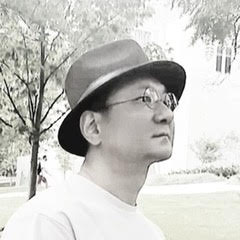 Growing up in Seoul, Korea, Demian was introduced to physics by reading an article by a well-known gravitational physicist, Bryce DeWitt. The implication of quantum theory on the fundamental structure of spacetime – spacetime bubbles – fascinated him.
Growing up in Seoul, Korea, Demian was introduced to physics by reading an article by a well-known gravitational physicist, Bryce DeWitt. The implication of quantum theory on the fundamental structure of spacetime – spacetime bubbles – fascinated him.
He eventually earned a B.S. and Ph.D. in physics from the University of Texas at Austin (where Dr. DeWitt was) and the University of Wisconsin-Milwaukee. After a post-doctoral stint at Raman Research Institute in Bangalore, India, he taught at the University of Wisconsin-River Falls, Kenyon College, then, Saint Mary’s University of Minnesota before came to Albion College in 2021.
He was trained as a theoretical gravitational physicist. He worked on various problems, from gravitational radiation reactions to quantum field theory on curved spacetime to quantum gravity in a higher-dimensional universe. His recent research focus, however, is computational neuroscience. AlphaGo beating Sedol Lee, the best Go-player in the world at the time, convinced him of the fascinating possibility of general AI. He is currently collaborating with colleagues from Indiana University, Bloomington, on information processing in the cerebral cortex and the critical state of the brain. He is also interested in how efficiency in information processing and energy consumption can constrain the modular structure of brains.
He is still thinking hard about his childhood problem, though. Recently, there have been some fascinating works from the foundations of quantum theory and quantum information science on the possibility of an indefinite causal structure. That is, cause and effect are not absolute. This opens up a possible evasion of Stephen Hawking’s chronology protection conjecture – quantum theory prohibits the universe from having the possibility of time travel. He is still learning and digesting, but thinking about these abstract questions has been fun.
When he is not in his office looking at a computer screen, you can find him in the chapel’s basement trying to learn to play piano.
Winter Assembly: All About That Space
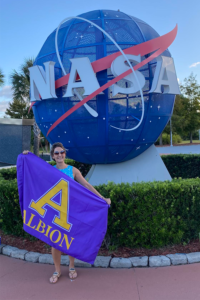 Thursday, January 11, 2024, 10 a.m.
Thursday, January 11, 2024, 10 a.m.
Nicolle Zellner, Albion College. Herbert and Grace Dow Endowed Professor in the Sciences Fellow, American Association for the Advancement of Science Recipient, Carl Sagan Medal for Science Communication
It’s an exciting time to be a space scientist! From observations of deep space via Hubble and the James Webb Space Telescope (JWST), to asteroid sample return from OSIRIS-REx, to planned investigations by Dragonfly (Titan) and Europa Clipper (Europa), space science offers something for everyone, now and in the future.
In this talk, I will present updates on several exciting space missions, including NASA’s initiative to return to the Moon. I will talk about Albion’s plans to celebrate 140 years of astronomy at Albion College and the upcoming solar eclipse in April.
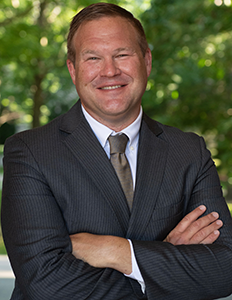 Fall Assembly: Dr. Wayne Webster, President, Albion College
Fall Assembly: Dr. Wayne Webster, President, Albion College
Thursday, September 7, 10 a.m.
Dr. Webster brings to Albion more than 23 years of leadership experience in education. Most recently, he served as Interim President of The College of Wooster in Ohio, and has also has worked in student engagement, development, and alumni relations. He has a deep love for the liberal art and for the kind of learning opportunities here in Albion. He has worked at private liberal arts colleges in Wisconsin, Pennsylvania, Nebraska and Ohio, and public university experience from his time in Colorado. As a collaborative leader, he has led increases in engagement in each of his roles, which have resulted in significantly more volunteer assistance with career development, internships and mentoring opportunities for students.
Post pandemic, the landscape for American higher education has shifted and will continue to do so as a new normal is created. Our colleges and universities are facing dramatic shifts in demographics, demand for programs, accountability for outcomes, and a generation of students who are debt adverse which causes additional financial stress. Dr. Webster will share his observations and draft plans for the future of Albion College as it edges closer to 200 years of service and he will seek feedback from those in attendance.
Spring Assembly: Music and Sound for Healing
Thursday, April 6, 2023, 10 a.m.

Tess Miller, DMA, CMP, CPC
“Music has Charms to soothe a savage Breast.” William Congreve
“Whenever the evil spirit from God came on Saul, David would take up the lyre and play. Then relief would come to Saul; he would feel better, and the evil spirit would leave him.”
— 1 Samuel 16:23, The Bible
When Dr. Miller was asked as a high school student what she wanted to do for a career, the first thing that came to mind was playing music for people in hospitals, hospices, and assisted living facilities. Many suggested Music Therapy as a focus of study, however, that was not quite what she had in mind. She decided instead to major in music performance and graduated with a DMA from Michigan State University in 2004.
After 15 years of performing and teaching in the field of Western Classical music, Dr. Miller felt that something was missing from her music offerings. In 2012, she remembered her original musical service interest and discovered the Music for Healing and Transition Program™ (MHTP), a Board-Certified Program that trains people to provide live, prescribed music at the bedside of the ill and dying. She became a Certified Music Practitioner (CMP®) in 2014 and works at McLaren Greater Lansing.
How is therapeutic music different from regular music for entertainment? What’s the difference between music therapy and therapeutic music? How does therapeutic music help in the healing process? And how is sound healing different from therapeutic music? These questions will be explored and interspersed with demonstrations.
In addition to her CMP work at the hospital, Dr. Miller is the Flute Instructor at Alma College and the MSU Community Music School. She performs regularly with the Traverse Symphony Orchestra and the Durant Street Wind Quintet. A lifelong learner herself, she became certified as a Professional Coach through the Institute for Professional Excellence in Coaching in 2019 and is currently a Counselor in Training through Central Michigan University.
Guest Speaker, Richard Norton Smith
Thursday, April 18, 7 p.m.
The Gerald R. Ford Institute for Leadership in Public Policy and Service is hosting an evening with nationally renowned historian, Richard Norton Smith, who will discuss his new book, An Ordinary Man: The Surprising Life and Historic Presidency of Gerald R. Ford.
Upper Baldwin Hall, Albion College
203 S. Hannah St. (Ditzler Way)
Albion, MI 49224 United States
Get Directions
The Only Man in Town
Sunday, June 11, 3 p.m.
A group trip is being planned to see the Chelsea Area Players production of “The Only Man in Town” Sunday, June 11, 3:00 p.m. at Chelsea High School. This true story is set as a musical about the rise and fall of early Chelsea entrepreneur Frank Glazier. Group rate is $10 per ticket. Contact mary_slater@hotmail.com if you are interested.
Winter Assembly: Update and Background of Solar Installation In Sheridan Township
Thursday, January 19, 2023
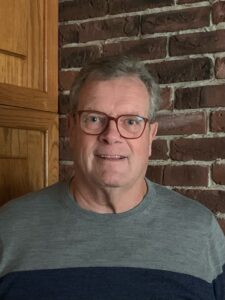 Richard Porter, Sheridan Township Supervisor, 2016 to present
Richard Porter, Sheridan Township Supervisor, 2016 to present
As township supervisor, Richard is responsible for representing the board, appointing committee members, doing all research for the board, and making recommendations on various issues. He also currently serves as a member of the County planning commission. In this role, he is required to make the annual Township budget, review all invoices and approve all payment of bills. He is also required to attend all tax board of reviews to take the minutes, and sign all contracts and documents for the township.
When the issue of large solar farms was first brought before the board, Richard was the chairman of the Township Planning Committee. Since then, the ordinance developed by the Committee has become widely used as a template throughout the state.
Richard is active in the community. He has served on his church board for over forty years, is the co-founder and president of the Albion Community Garden, is the president of the Albion chapter of VMCCA, is involved with the antique auto club, and serves on the board of Scout Troop 158. As a Navy veteran, he has served as the commander of the American Legion.
Fall Assembly: Evolving Fractal Art
Thursday, September 8, 10 a.m.
Dr. Robert Erlandson, Professor Emeritus, Electrical and Computer Engineering, Wayne State University.
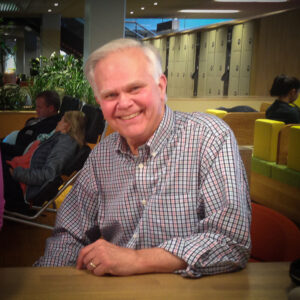 The word “fractal” was coined in 1975 by Benoit Mendelbrot to describe the new form of mathematics he was creating to model earthquakes and other effects of chaotic forces. Since the word was introduced we have come to understand we live in a world of fractals and consequently we now view our world differently than before 1975. This presentation, Evolving Fractal Art, looks at art prior to and after 1975, after showing the omnipresence of fractal patterns in our lives.
The word “fractal” was coined in 1975 by Benoit Mendelbrot to describe the new form of mathematics he was creating to model earthquakes and other effects of chaotic forces. Since the word was introduced we have come to understand we live in a world of fractals and consequently we now view our world differently than before 1975. This presentation, Evolving Fractal Art, looks at art prior to and after 1975, after showing the omnipresence of fractal patterns in our lives.
Dr. Robert Erlandson’s professional career included research in enabling technologies, data-analysis and decision-making as applied to resource allocation in public school systems, service robots in rehabilitation therapy and development of bio-instruments. His retirement interests have included fractal art work and Haiga poetry. He is the author of AWE, 2018.
From Toxic Chemicals to Fossil Fuels to Trillium: Making Green End-of-Life Decisions
Thursday, April 14, 2022, 10 a.m.
William E. Strohaver
 My personal journey to explore end-of-life options began in earnest after reading “Dying to be Green,” in the September/October 2010 issue of the Audubon Magazine. My parents had chosen as their final resting place a new cemetery located in a rural area with native trees and shrubs mixed with nursery stock, no artificial monuments, or tombstones – simply a small plaque with names and dates. This option still did not resolve all of my personal issues associated with embalming, vaults, and caskets. I had always assumed, that when the time came, I would be cremated. The Audubon article pointed out that a growing number of Americans would prefer final resting places filled with wildflowers not concrete, steel and granite. It compared and contrasted the different end-of-life options – conventional embalming/vault burials, cremation, and natural or “green” burials – educating the reader about the many myths and beliefs about burials including what we believe is law. The most significant take away was the fact that cremation is NOT a “green” alternative to conventional burial. If you are concerned about global warming and your personal carbon footprint, or clean air and water, habitat protection, and protecting land from development; then green options should be explored. For the last ten years, my journey has included researching, interviewing, and visiting natural cemeteries ultimately advocating for a Trillium resting place. This presentation will cover the pros and cons of conventional and cremation end-of-life options; the definition and types of green cemeteries and how they are certified; location of green certified cemeteries in Michigan, and examples of conservation cemeteries “the greenest of the green” across the country. Finally, we will take a deeper look at two conservation cemeteries: Foxfield and Kokosing which were founded in Ohio consistent with Ohio Cemetery Laws. Foxfield Preserve is located in Wilmot, Ohio and is the first conservation burial ground in the country to be operated by a conservation organization. Foxfield is a subsidiary of the Wilderness Center, a nonprofit nature center and land trust. Kokosing Nature Preserve is operated by the Philander Chase Conservancy, Kenyon College’s Land Trust in Gambier, Ohio. Finally, a list of books and articles and other resources will be provided if you are inspired to start your own journey.
My personal journey to explore end-of-life options began in earnest after reading “Dying to be Green,” in the September/October 2010 issue of the Audubon Magazine. My parents had chosen as their final resting place a new cemetery located in a rural area with native trees and shrubs mixed with nursery stock, no artificial monuments, or tombstones – simply a small plaque with names and dates. This option still did not resolve all of my personal issues associated with embalming, vaults, and caskets. I had always assumed, that when the time came, I would be cremated. The Audubon article pointed out that a growing number of Americans would prefer final resting places filled with wildflowers not concrete, steel and granite. It compared and contrasted the different end-of-life options – conventional embalming/vault burials, cremation, and natural or “green” burials – educating the reader about the many myths and beliefs about burials including what we believe is law. The most significant take away was the fact that cremation is NOT a “green” alternative to conventional burial. If you are concerned about global warming and your personal carbon footprint, or clean air and water, habitat protection, and protecting land from development; then green options should be explored. For the last ten years, my journey has included researching, interviewing, and visiting natural cemeteries ultimately advocating for a Trillium resting place. This presentation will cover the pros and cons of conventional and cremation end-of-life options; the definition and types of green cemeteries and how they are certified; location of green certified cemeteries in Michigan, and examples of conservation cemeteries “the greenest of the green” across the country. Finally, we will take a deeper look at two conservation cemeteries: Foxfield and Kokosing which were founded in Ohio consistent with Ohio Cemetery Laws. Foxfield Preserve is located in Wilmot, Ohio and is the first conservation burial ground in the country to be operated by a conservation organization. Foxfield is a subsidiary of the Wilderness Center, a nonprofit nature center and land trust. Kokosing Nature Preserve is operated by the Philander Chase Conservancy, Kenyon College’s Land Trust in Gambier, Ohio. Finally, a list of books and articles and other resources will be provided if you are inspired to start your own journey.
Albion College and the Community
Thursday, September 9, 2021, at 10 a.m.
Dr. Mathew Johnson, President of Albion College
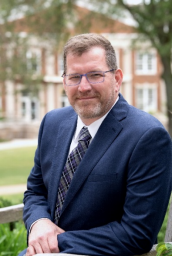 Dr. Mathew Johnson began his tenure as the 17th president of Albion College on July 1, 2020. A global leader in higher education, he leads the development of Carnegie Foundation Elective Classifications, the Elective Classification for Community Engagement, and a multi year international Carnegie Community Engagement Classification project, involving 26 institutions of higher education across the world. Dr. Johnson co-founded and co-directs the National Assessment of Service and Community Engagement. He also sits on the editorial board for Gateways: International Journal of Community Research and Engagement, and has been recognized as an Ashoka Change Leader by the Ashoka Foundation. Dr. Johnson serves as a Carnegie Visiting Fellow at the Carnegie Foundation for the Advancement of Teaching, and is a fellow at the Doerr Institute for New Leaders at Rice University. He consults for universities globally and has led projects in Ghana, Bolivia, India and elsewhere.
Dr. Mathew Johnson began his tenure as the 17th president of Albion College on July 1, 2020. A global leader in higher education, he leads the development of Carnegie Foundation Elective Classifications, the Elective Classification for Community Engagement, and a multi year international Carnegie Community Engagement Classification project, involving 26 institutions of higher education across the world. Dr. Johnson co-founded and co-directs the National Assessment of Service and Community Engagement. He also sits on the editorial board for Gateways: International Journal of Community Research and Engagement, and has been recognized as an Ashoka Change Leader by the Ashoka Foundation. Dr. Johnson serves as a Carnegie Visiting Fellow at the Carnegie Foundation for the Advancement of Teaching, and is a fellow at the Doerr Institute for New Leaders at Rice University. He consults for universities globally and has led projects in Ghana, Bolivia, India and elsewhere.
Earning his Ph.D. and M.A. in sociology from Brandeis University, Dr. Johnson has been a faculty member for more than 20 years. He has held appointments as Professor of the Practice in Sociology and served as a tenured professor in both sociology and environmental studies at his undergraduate alma mater, Siena College.
Dr. Johnson maintains an active research and professional academic profile, including several edited volumes, chapters and articles. Dr. Johnson will be sharing the current strategic vision at Albion College and some key areas of focus on our campus currently. These include a renewed focus on building sustained partnerships with the Albion community, grounded in the idea of belonging. Over the past year, the College has made strides on prioritizing diversity, equity and inclusion for our students. Ultimately, our goal is to create a sense of belonging on campus — where all students, staff, faculty and community members know that they have a home. This work takes deep personal and professional commitment which our campus has embarked on. The College is eager to continue to grow our partnerships in Albion to make an even greater impact.
Finding Nellie Bly—Fact and Fiction
Streaming on Thursday, April 22, 2021, at 10 a.m.
David Blixt, author and actor
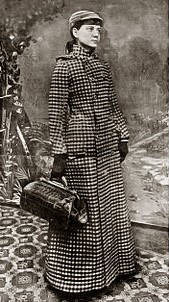 Nellie Bly, the pioneering undercover reporter and daredevil who was the basis for Lois Lane, is an icon for feminists, journalists, and industrialists. With a career spanning the Sullivan-Kilrain fight in 1889 to the trenches of World War I, Bly divided her time evenly between undercover stunts, dramatic exposés, and in-depth interviews. What was not known until this year was that she was also a prolific novelist, writing a dozen novels, eleven of which were lost until they were discovered and published by novelist David Blixt. He stumbled across them as he researched the sequel to his bestselling novel about Bly, What Girls Are Good For. Blixt will discuss Bly’s life, the impact of this discovery, and how an author tackles a real-life subject in fiction.
Nellie Bly, the pioneering undercover reporter and daredevil who was the basis for Lois Lane, is an icon for feminists, journalists, and industrialists. With a career spanning the Sullivan-Kilrain fight in 1889 to the trenches of World War I, Bly divided her time evenly between undercover stunts, dramatic exposés, and in-depth interviews. What was not known until this year was that she was also a prolific novelist, writing a dozen novels, eleven of which were lost until they were discovered and published by novelist David Blixt. He stumbled across them as he researched the sequel to his bestselling novel about Bly, What Girls Are Good For. Blixt will discuss Bly’s life, the impact of this discovery, and how an author tackles a real-life subject in fiction.
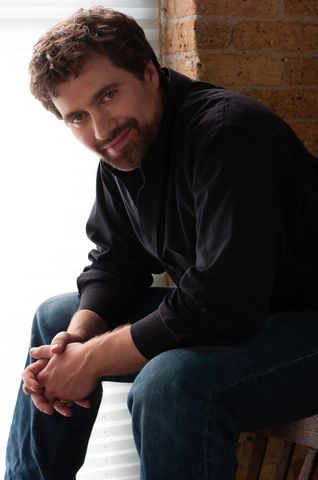 Blixt’s Historical Fiction is consistently described as “intricate,” “taut,” and “breathtaking.” His work spans the Roman Empire (the Colossus series, his play Eve of Ides) to early Renaissance Italy (the Star-Cross’d series) through the Elizabethan era (his delightful espionage comedy Her Majesty’s Will, starring Will Shakespeare and Kit Marlowe as hapless spies) to the Victorian age with his series following daredevil journalist Nellie Bly. His novels combine a love of the theatre with a deep respect for the quirks and passions of history.
Blixt’s Historical Fiction is consistently described as “intricate,” “taut,” and “breathtaking.” His work spans the Roman Empire (the Colossus series, his play Eve of Ides) to early Renaissance Italy (the Star-Cross’d series) through the Elizabethan era (his delightful espionage comedy Her Majesty’s Will, starring Will Shakespeare and Kit Marlowe as hapless spies) to the Victorian age with his series following daredevil journalist Nellie Bly. His novels combine a love of the theatre with a deep respect for the quirks and passions of history.
An actor and world traveler as well as a writer, David has ridden camels around the pyramids at Giza, been thrown out of the Vatican Museum and been blessed by John-Paul II, scaled the Roman ramp at Masada, crashed a hot-air balloon, leapt from cliffs on small Greek islands, dined with Counts and criminals, climbed to the top of Mount Sinai, and sat in the Prince’s chair in Verona’s palace. But David is happiest at his desk, weaving tales of brilliant people in dire and dramatic straits. Living in Chicago with his wife and two children, David describes himself as “actor, author, father, husband. In reverse order.”
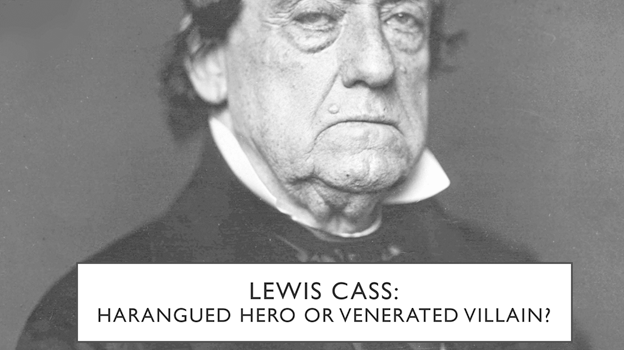
“Lewis Cass: Harangued Hero or Venerated Villain?”
Streaming on Thursday, January 21, 2021, at 10 a.m.
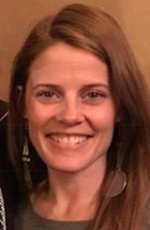 Allison Harnish, Ph. D., Associate Professor of Anthropology, Albion College
Allison Harnish, Ph. D., Associate Professor of Anthropology, Albion College
Following the murder of George Floyd on May 25, 2020, the largest mass demonstration in US history unfolded in thousands of cities across the country. Hundreds of monuments and memorials associated with racism, slavery, and genocide were destroyed or removed. Some cities made plans to retire statues dedicated to Columbus and the Confederacy, while Congress folded into the 2020 National Defense Authorization Act language to establish a committee for renaming military bases that honor white supremacists. How is this movement being felt in Michigan?
On June 30 Governor Gretchen Whitmer announced downtown Lansing’s Lewis Cass Building would be renamed for Republican State Rep. Melvin Larsen and Democratic State Rep. Daisy Elliott, who cosponsored in 1976 Michigan’s landmark Civil Rights Act. This change marks the first time in Michigan history that a state building is named after an African-American woman. Two days later, Michigan’s Democratic Congressional Delegation (consisting of U.S. Senators Debbie Stabenow and Gary Peters, as well as U.S. Representatives Dan Kildee, Debbie Dingell, Brenda Lawrence, Andy Levin, Elissa Slotkin, Haley Stevens and Rashida Tlaib) called for the removal of Lewis Cass’s likeness from the National Statuary Hall. Meanwhile, Lewis Cass Technical High School and Lewis Cass Intermediate School District are having internal conversations about their namesake. This AALL presentation aims to explain what all this fuss is about: Who was Lewis Cass? Why are so many places in Michigan named for him? And why, in 2020, are some people reevaluating his legacy?
Allison “Alli” Harnish is an Associate Professor of Anthropology at Albion College, where she teaches courses on (post- and settler) colonialism and environmental justice. Her research, which has been externally funded by the Fulbright program and the National Science Foundation explores the social consequences of development-induced displacement, wildlife conservation, and environmental change in Zambia.
Fall Assembly – “A Campaign Like No Other: Making Sense of the 2020 American Election”
Streaming Thursday, September 10, 11:15 a.m.
Patrick McLean
Director of the Gerald R. Ford Institute for Leadership in Public Policy and Service, Albion College
 In the midst of a pandemic, one of the most polarizing figures in modern American political history seeks a second term while his opponent campaigns from his basement. Polls seems to give the challenger, Democrat Joe Biden, the edge, but the polls said something similar about Hillary Clinton in 2016.
In the midst of a pandemic, one of the most polarizing figures in modern American political history seeks a second term while his opponent campaigns from his basement. Polls seems to give the challenger, Democrat Joe Biden, the edge, but the polls said something similar about Hillary Clinton in 2016.
This talk will try to make sense of the campaign that will (probably) end on November 3. What will the candidates’ strategies be? What is the reelection pathway for the incumbent president? What impact will the election have on other races, particularly the races that will determine control of the US Senate? We will discuss all of this and more, and we’ll leave plenty of time for questions.
Patrick McLean brings more than 20 years of public sector experience to Albion, including top level positions in state government, local government and the nonprofit sector. Most recently Patrick spent four years as Finance Director for the City of Toledo, and his 11-years with the Ohio legislature, included four years as Minority Chief of Staff. Patrick earned his B.A. in Political Science from the University of Dayton and his first M.A. in Political Science from Miami University. He recently completed a second M.A. in International Relations from Freie Universität Berlin Center for Global Politics. Patrick also holds a Certificate in not-for-profit management and fundraising from New York University. He has taught courses in American and International Politics, Global Issues and Philanthropy at institutions of higher education in Michigan, Ohio and New York. At Albion his courses include public policy, state and local government, innovative cities, an interdisciplinary Honors course on Canada, and one of the few courses (as far as he knows) specifically on Gerald Ford in the world. He has lectured on the presidency and on American campaigns in Canada and in Poland, and has spent his pandemic studying French and Polish.
Spring Assembly – Irene Butter: Holocaust Survivor and Peace Activist
Thursday, April 2, 2020, 10 a.m.
In accordance with the new CDC recommendation to cancel gatherings of 50 people, we will not hold our Spring Assembly and Annual Meeting.
I hope we may be able to reschedule our speaker, Dr. Irene Butter, for a later assembly. The Annual Meeting will be held in conjunction with the Fall Assembly on September 3.
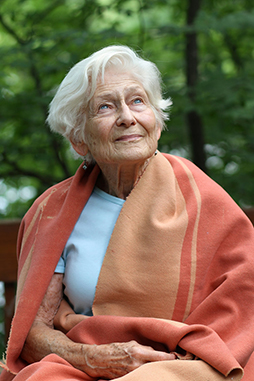 Irene Hasenberg Butter was born in Berlin and grew up as a Jewish child in Nazi-occupied Europe. While living in Holland, she and her family were deported to Nazi-controlled prison camps and finally Bergen-Belsen, where she was a fellow prisoner with Anne Frank. In the years following the Holocaust, she was forbidden from speaking about her experiences by the American relatives who cared for her. Dr. Butter is now making up for lost time. She sends a poignant message against hate at a time when anti-Semitic, fascist and xenophobic movements around the globe are experiencing a resurgence. Dr. Butter has shared the stage with peacemakers such as the Dalai Lama, Desmond Tutu, and Elie Wiesel, and she considers it her duty to tell her story now and on behalf of the six million Jews who have been permanently silenced.
Irene Hasenberg Butter was born in Berlin and grew up as a Jewish child in Nazi-occupied Europe. While living in Holland, she and her family were deported to Nazi-controlled prison camps and finally Bergen-Belsen, where she was a fellow prisoner with Anne Frank. In the years following the Holocaust, she was forbidden from speaking about her experiences by the American relatives who cared for her. Dr. Butter is now making up for lost time. She sends a poignant message against hate at a time when anti-Semitic, fascist and xenophobic movements around the globe are experiencing a resurgence. Dr. Butter has shared the stage with peacemakers such as the Dalai Lama, Desmond Tutu, and Elie Wiesel, and she considers it her duty to tell her story now and on behalf of the six million Jews who have been permanently silenced.
In 1945 Dr. Butter came to the United States, where she attended high school and college. She was one of the first women to earn a PhD in economics from Duke University, and was a professor of Public Health at the University of Michigan, where she was a co-founder of the Raoul Wallenberg Medal and Lecture series. She is also a cofounder of Zeitouna, an Arab/Jewish women’s dialogue group in Ann Arbor.
Dr. Butter’s memoir, Shores Beyond Shores, will be available for purchase and signing following her presentation.
Tennant Hall at the First United Methodist Church
600 E Michigan Ave, Albion, MI 49224
Get Directions
Winter Assembly – “There is Nothing Like Having a Slave”: White Union Soldiers’ Attitudes about Race during the American Civil War
Thursday, January 9, 2020, 10 a.m.
Marcy Sacks, Ph.D.
Julian S. Rammelkamp Professor of History, Albion College
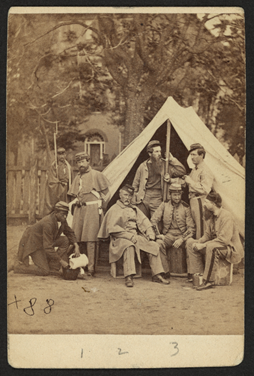 When northern white men went to war during the 1860s to fight for the Union, they took with them their prejudices and ignorance about African Americans. As they encountered black people, a remarkable number of these soldiers developed fantasies about becoming slave owners themselves. In this presentation for AALL, I will discuss the evolution of whites’ racial attitudes, specifically their growing desire for slave ownership. Allowing participants to examine soldiers’ letters, diaries, and staged photographs (like the one attached here), we will explore how their interactions with black people cultivated among whites a desire to have dominion over another human being, even as they denounced southern Confederates for doing precisely that. The mythologies they created about themselves allowed them to imagine genuinely paternalistic relationships with “their” servants (their letters are replete with proprietary language) at the same time that they scoffed at southern whites for believing that enslaved people welcomed their bondage. These fantasies hampered black people’s efforts to be recognized as fully free or equal citizens.
When northern white men went to war during the 1860s to fight for the Union, they took with them their prejudices and ignorance about African Americans. As they encountered black people, a remarkable number of these soldiers developed fantasies about becoming slave owners themselves. In this presentation for AALL, I will discuss the evolution of whites’ racial attitudes, specifically their growing desire for slave ownership. Allowing participants to examine soldiers’ letters, diaries, and staged photographs (like the one attached here), we will explore how their interactions with black people cultivated among whites a desire to have dominion over another human being, even as they denounced southern Confederates for doing precisely that. The mythologies they created about themselves allowed them to imagine genuinely paternalistic relationships with “their” servants (their letters are replete with proprietary language) at the same time that they scoffed at southern whites for believing that enslaved people welcomed their bondage. These fantasies hampered black people’s efforts to be recognized as fully free or equal citizens.
Marcy Sacks earned her Ph.D. in U.S. History at the University of California at Berkeley. She has been teaching history at Albion College for over 20 years. She has written two books, Before Harlem: The Black Experience in New York City before World War I, and Joe Louis: Race and Sports in Twentieth-Century America. She is now at work on a third book about white Union soldiers’ racial attitudes during the Civil War.
When she is not teaching or researching, Marcy can usually be found running somewhere.
Tennant Hall at the First United Methodist Church
600 E Michigan Ave, Albion, MI 49224
Get Directions
ALBION AREA LIFELONG LEARNERS CELEBRATE 20 YEARS
The Albion Area Lifelong Learners (AALL) has been providing learning opportunities for adults over fifty-five for twenty years. The group recently celebrated the anniversary at its Fall Assembly on September 5 featuring Dr. James Curtis, who talked about his book, “Memoirs of a Black Psychiatrist: A Life of Advocacy for Social Change.” Sitting on the stage of Washington Gardner Auditorium where he spoke and acted as a high school student, Curtis shared observations on his formative years in Albion and Ann Arbor. Following his career as a psychiatrist and hospital administrator in New York City, Curtis retired to his hometown of Albion in 2003.
Following the presentation, board of directors member Mary Slater spoke on AALL’s 1999 origins in cooperation with Albion College. She then distributed a booklet briefly outlining the organization’s history and listing over 300 classes that have been offered over the years.
Fall Assembly 2019
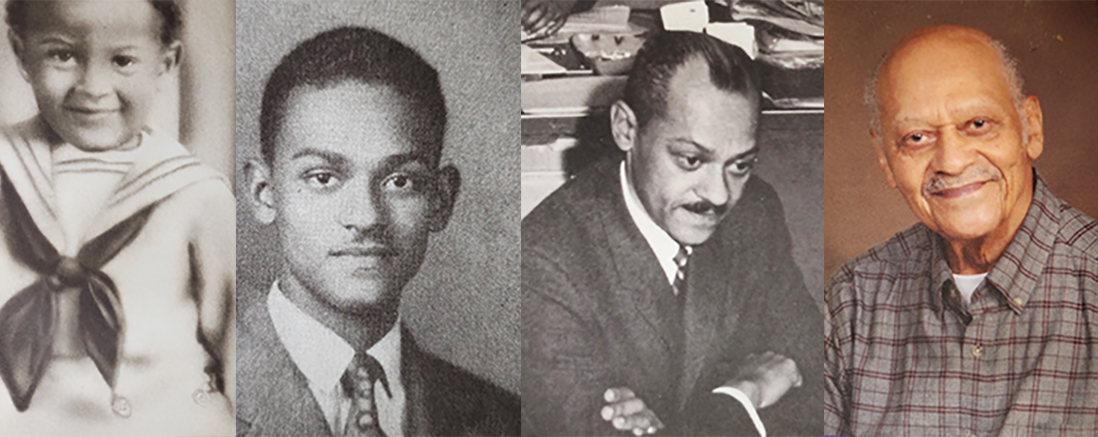
LEADING A LIFE OF ADVOCACY: A Conversation with Dr. James L. Curtis, M.D.
Thursday, September 5, 10 a.m.
Dr. James A. Curtis is a familiar figure around Albion. A graduate of Washington Gardner High School, Albion College, and the University of Michigan Medical School, Dr. Curtis has been living in Albion since 2003 following his retirement as Director of Harlem Hospital Department of Psychiatry and Clinical Professor of Psychiatry at the Columbia University College of Physicians.
Born in 1922, Dr. Curtis pursued his education during the World War II era and began his career during the civil rights movement. Along his way to the top of his field in academic medicine, Curtis faced and addressed issues of race, class, and social injustice. Buoyed by a strong optimism and blessed with keen insight, Dr. Curtis will discuss some of the hurdles he has faced in his own life, and share some advice for the challenges we all face as a community, a country, and a world.
Dr. Curtis, an active participant in the Albion Area Lifelong Learners, will discuss his life-long advocacy for social change with Royal Ward, president of AALL.
Dr. Curtis’ autobiography, Memoirs of a Black Psychiatrist: A Life of Advocacy for Social Change, details his life goal of improving the quality of life and full citizenship for his people, his family, his community, and the world. Copies can be purchased at Stirling Books and Brew in Albion. It will also be available at the Assembly meeting.
Washington Gardner School401 E. Michigan Ave.
(Elevator available at west entrance off of N. Berrien St.)
Get Directions
Spring Assembly 2019
Spring Assembly – Starry Eyes for Chile Skies
Thursday, April 4, 10 a.m.
Nicolle Zellner, Ph.D.
Professor of Physics, Albion College

Due to its unique location on the path of the Humboldt Current, Chile has some of the world’s best skies and provides spectacular views on ~320 clear nights per year. Thus, as a result of international funding and collaborations, Chile is rapidly becoming the astronomical capital of the world: by the late 2020s, it will be home to four (of the five) next-generation telescopes.
In June 2018, a team of nine individuals—eight from the United States and one from Chili—embarked on a ten-day expedition for behind-the-scenes visits to key astronomy research sites in Chile as part of the prestigious NSF-funded Astronomy in Chile Educator Ambassadors Program (ACEAP). In a talk that will make you ask “Why Chile?” and “How can I get there?”, Nicolle Zellner will share with you her experiences in ACEAP and show you some of her “good” and her teammates’ “great” astro-photographs of the southern sky.
Nicolle Zellner, Ph.D. is professor of physics at Albion College where she teaches introductory and advanced astronomy and physics courses. Nicolle’s research focuses on understanding the impact history of the Earth-Moon system and how those impacts affected the conditions for life on Earth. She studies lunar impact glasses to interpret the bombardment history of the Moon (and Earth), and a second project focuses on understanding how the chemistry of simple molecules is affected by impacts. She has more than 45 scientific publications to her name, 90 conference presentations and publications, and over 100 community outreach activities.
During the 2006–2007 field season, she was a member of the ANSMET team that searched for meteorites in Antarctica. She spent two months there, and she and the team collected over 800 meteorites. Before joining the Albion faculty in 2005, she was distinguished as a member of NASA’s 1995 Astro-2 mission ground crew, and most recently she was named Phi Beta Kappa Scholar of the Year (2017) and Arthur Anderson Teacher of the Year (2018) at Albion College.
Tennant HallAlbion United Methodist Church
600 E. Michigan Ave.
Get Directions
Winter Assembly 2019
Let’s Dance: Diabelli, Beethoven, Carter Pann, and Two Hundred Years of a Viennese Waltz
Dr. Lia Jensen-Abbott, Ph.D. – Associate Professor of Music at Albion College
January 10th at 10 am – Goodrich Chapel, Albion College
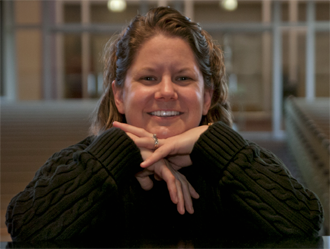 In approximately 1819, Anton Diabelli (1781-1858), a well-known Viennese pianist, composer, and music publisher, approached eighty-three of the most famous composers living and working in Vienna to write one variation on a theme (a waltz) that he composed. One of those composers was Beethoven, who reportedly tossed aside the Waltz and called it a “cobbler’s patch.” This project was ultimately, for Diabelli, a way to publish music, and therefore, a lucrative business enterprise for his publishing firm. But its unique compilation was also part of a philanthropic endeavor to help widows and orphans of the Napoleonic Wars. Fifty composers other than Beethoven responded to Diabelli’s request.
In approximately 1819, Anton Diabelli (1781-1858), a well-known Viennese pianist, composer, and music publisher, approached eighty-three of the most famous composers living and working in Vienna to write one variation on a theme (a waltz) that he composed. One of those composers was Beethoven, who reportedly tossed aside the Waltz and called it a “cobbler’s patch.” This project was ultimately, for Diabelli, a way to publish music, and therefore, a lucrative business enterprise for his publishing firm. But its unique compilation was also part of a philanthropic endeavor to help widows and orphans of the Napoleonic Wars. Fifty composers other than Beethoven responded to Diabelli’s request.
But it turned out to be a project of great historical significance—the Fifty Diabelli Variations (only four manuscripts survive in the world) serve as a nationalistic representation of Viennese and the larger Austrian musical culture. Many of the composers included in this collection are indeed unknown to pianists today while some of them are quite famous—Schubert, Franz Liszt (who was only 11 at the time of publication), Carl Czerny. Absent from the collection is the most famous composer, Beethoven. There is another collection by Beethoven himself—the famous ‘Diabelli’ Variations, Op. 120, published in 1823 by Diabelli’s firm as Part 1, while Diabelli’s set appeared in 1824 as Part 2. Beethoven wrote his own fifty-minute cycle with thirty-three variations, concluding with a minuet.
While my own dissertation deals extensively with the Beethoven set, and superficially with the Diabelli collection, it has become my great passion to embark upon a rather innovative new performance and research connection: The Albion College Diabelli Squared Project. I have been seriously considering the structure of variations themselves. Unlike sonata form, which is an organic kind of structure, variations often simply stand as a means for a composer and ultimately pianist to superficially show off technically and musically. But, of course, the Beethoven set is anything but superficial. It has an organicism and structural power that makes it one of the greatest works in existence today for the keyboard.
As our society has undergone a great schism in terms of diversity and what it means to think and co-exist globally, I realized that variation form is EXACTLY the same kind of construct—the variations function at once to underscore the commonalities of the theme itself, but they also serve to explore, champion, and embrace, difference and diversity.
When society struggled over the last several years with issues of racial tolerance and diversity/equality issues, I began to consider parallels with the variations structure itself. If we are indeed going to be able to work together as a global society, we must be able to embrace difference as well as find commonalities between our varied cultures. Variation form at its most inherent structural core underscores this exact phenomenon. Different individuals then subject a single theme, serving as the unifying element, to diverse treatment in this case. Each variation, then, stands as its own piece and exposes the beautiful differences and subtle diverse nuances of the theme. Literally, variations expose variety and elevate diversity as an element to be appreciated and championed. But underneath, every single variation maintains some kind of connection with the original theme. To my way of thinking, the process of variations is a commentary about social justice from a psychological, cultural, musical, and structural viewpoint.
From that basic construct, then, I envisioned the idea to learn the old two masterworks, to commission a new set of variations, and finally, to add the larger global initiative of the ongoing submission website. Literally, this project will never end. It will actually be alive as a musical process. I will begin with a series of lectures about all three works, and performances in the next year, and as new variations are added, I can create new performances. I will be responsible for ordering the variations, so it is possible that with each new performance there will be a new ordering of the variations. In essence, I truly believe that this is the core of liberal arts at work.
My discussion for the AALL presentation will present a performance of several of the Diabelli fifty variations, along with several of Beethoven’s set, in addition to some of my commissioned variations. I will use a semiotic analysis of the original waltz theme as a point of departure.
Dr. Lia Jensen-Abbott is an Associate Professor of Music at Albion College where she teaches music theory, aural skills, keyboard skills, piano, piano pedagogy, and piano literature. She is well known for her interdisciplinary lecture recitals based on semiotic analysis. Her solo and collaborative performances have taken her around the United States including Hawaii, Montana, Florida, Alabama, Louisiana, and Tennessee among others. She has also traveled extensively abroad including Serbia, France, Switzerland, Italy, Sweden, Finland, Nottingham, UK, and Costa Rica. As a clinician and adjudicator, Lia has been invited to judge the MTNA National Finals in San Antonio and Chicago, and she has presented at the MTNA National Conference two times. An active member of the Music Teachers National Association, Lia recently became a Nationally Certified Teacher of Music, and is now the President of the Michigan Music Teachers Association. Lia is also a member of the European Piano Teachers Association and the World Piano Teachers Association, and is repeatedly asked to give pre-concert lecture recitals at the International Gilmore Keyboard Festival. In February 2019, Lia will again be a teacher and performer at the Gilmore Keyboard Festival KeysFest, and has taught at the Gilmore Summer Camp since 2007. She is a co-founder of the Albion College International Piano Festival and Competition and lives in Albion, Michigan with her husband, pianist Dr. David Abbott, her son Charlie, and two dogs. In her spare time, Lia is competing in triathlons, plays golf, and reads.
Winter Assembly 2018
Mass Incarceration: Our Addiction to Jail-house Profit and Punishment
Dr Scott Melzer, Ph.D.
Professor of Sociology, Albion College
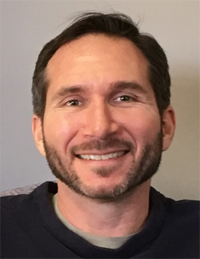
The United States incarcerates more people today, and does so at a higher rate, than any nation, ever. The number has spiked from around 300,000 incarcerated people in the 1970s to well over two million people today. The War on Drugs and other “tough on crime” policies and practices, that have yielded these historically high rates of incarceration, are racially biased. African-American and Latino men have been the prime targets, disproportionately arrested and incarcerated, and subject to a lifetime of stigma and discrimination.
Dr. Scott Melzer (Ph.D., University of California) is professor of sociology in Albion College’s department of Anthropology and Sociology. His teaching and research interests are in gender, social psychology, and criminology, with particular interests in intimate violence such as violence against partners, male self-concepts threatened by status, gun politics, and social change. He co-founded and co-directs Albion College’s Inside-Out Prison Exchange Program, a semester-long seminar that brings together college students and people who are incarcerated in a correctional facility. He has published Gun Crusaders: The NRA’s Culture War (NYU Press, 2009), an analysis of the National Rifle Association’s transformation from a recreational firearms interest group into a conservative social movement organization. Dr. Melzer’s next book examines violence against women when males are unwilling or unable to fulfill body and breadwinner ideals.
Fall Assembly 2018 – postponed to Spring 2019
Fall Assembly 2017
Why Shakespeare: Classical Theatre as Societal Connection and Legitimate Entertainment
Janice L. Blixt
The Michigan Shakespeare Festival’s Producing Artistic Director
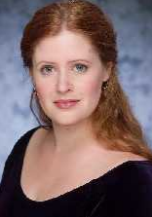 The Michigan Shakespeare Festival’s Producing Artistic Director, Janice L. Blixt, will talk about the trials and tribulations of being the public face of a classical theatre: from the honest aspects of being an arts organization in a socially, politically, and financially divided America to how she answers the constantly posed question, “Why do you bother to produce Shakespeare?”
The Michigan Shakespeare Festival’s Producing Artistic Director, Janice L. Blixt, will talk about the trials and tribulations of being the public face of a classical theatre: from the honest aspects of being an arts organization in a socially, politically, and financially divided America to how she answers the constantly posed question, “Why do you bother to produce Shakespeare?”
Janice L Blixt has just concluded her eighth award-winning season as the Producing Artistic Director of the Michigan Shakespeare Festival. As a director and adapter, her most recent works include a world premiere production of a new translation of Anton Chekhov’s The Seagull, an original adaptation of Henry IV — a combination of both Henry IV plays into one epic production, and acclaimed productions of Julius Caesar, Richard II, A Midsummer Night’s Dream, Hamlet, Twelfth Night, Richard III, Much Ado About Nothing, The Winter’s Tale, Romeo & Juliet, Oscar Wilde’s The Importance of Being Earnest, George Bernard Shaw’s Pygmalion, and Karen Tarjan’s play of Michael Shaara’s novel The Killer Angels.
Spring Assembly 2017
Climate Change in Michigan: Impacts and Opportunities for Action
Kate Madigan, Energy and Climate Specialist
Director, Michigan Climate Action Network
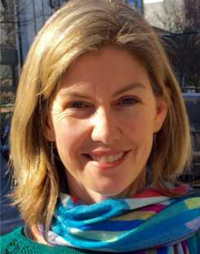 We are now seeing the impacts of climate change in Michigan and around the world, and 2016 was the warmest year ever recorded globally. In this talk, Kate Madigan will give an overview of our changing climate, sharing the latest news and developments, including how climate change is impacting Michigan. She also will discuss solutions to climate change, efforts underway around the world to reduce climate pollution, and opportunities for action in our own communities.
We are now seeing the impacts of climate change in Michigan and around the world, and 2016 was the warmest year ever recorded globally. In this talk, Kate Madigan will give an overview of our changing climate, sharing the latest news and developments, including how climate change is impacting Michigan. She also will discuss solutions to climate change, efforts underway around the world to reduce climate pollution, and opportunities for action in our own communities.
Kate Madigan specializes in climate change and energy policy for Michigan Environmental Council and directs the Michigan Climate Action Network. She led the effort to get Traverse City to commit to 100% renewable energy by 2020, and her current work includes supporting other communities working to pass strong, clean energy goals.
Kate joined MEC in 2005, and prior to this she led advocacy and organizing efforts promoting clean water, safe food, and renewable energy in Los Angeles and Lansing. A Michigan native, Kate holds a bachelor’s degree from the University of Michigan’s School of Natural Resources and the Environment and a master’s degree in management from the School for International Training in Vermont. Kate lives with her husband and two sons in Traverse City.
Some of our previous trips:
AALL Field Trip to the Everglades National Park
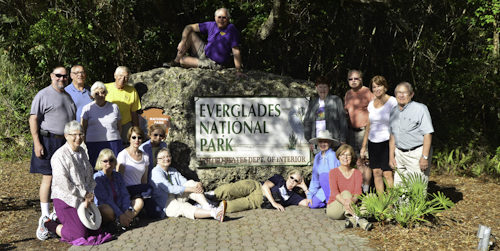
AALL Field Trip to the Arab American National Museum in Dearborn, MI.

